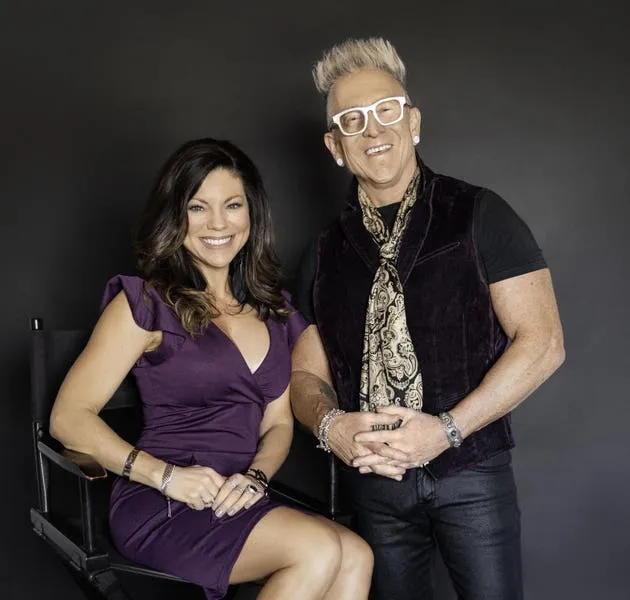Forbes contributors publish independent expert analyses and insights.
When Mark Schulman was touring with Pink, he played to sold-out arenas around the world. But he knew the spotlight wasn't on him. "Imagine being on stage in front of 50,000 people and not one set of eyes is looking at you," Schulman told me. "Welcome to my world."
As a drummer, Schulman played a supporting role - critical to the show, yet outside the spotlight. That experience now informs his work as a keynote speaker and co-creator of the Everyday Rockstar experience, a high-energy program he delivers alongside neuro-performance coach Heather J. Crider.
Schulman believes the business world has a lot to learn from the band dynamic. "Every single person's job is absolutely critical," he said. "If you look at a well-oiled organization and you take anybody out of it, the magnitude of success gets diminished."
"I used to play every note and try to show off," he said of his early days as a drummer. "And I got kicked out of bands." As he matured, he learned the power of restraint and precision. "I'm going to be of the greatest value when I just take pride in every note. How perfect can I play that one groove?" That growth led to decades on tour with stars like Cher, Foreigner and Pink.
And that mindset is now the core of his message to corporate audiences. "What if work is not about the job?" he asked. "What if work is about how you show up and who you are?"
Schulman encourages people to embrace their roles with confidence and pride - not to seek the spotlight, but to recognize their essential contribution. "We all can be everyday rockstars when we play into our roles as the best we can be," he said.
The Everyday Rockstar philosophy redefines success as contribution rather than recognition. Schulman and Crider help attendees optimize their impact, and as Schulman notes, "when you're focusing on impact, that draws the attention away from yourself."
Crider adds that this kind of impact requires connection, not perfection. "We have so much pressure on performance that we forget to connect to why we're doing it," she said. "It's important to want to be the best we can be so that way everyone shines."
In our interview, Schulman recalled a woman on Pink's tour whose job was to have the perfect temperature of water on stage, available for the singer after physically demanding aerial stunts. "That woman could be considered the most important person on that tour at that moment," he said, because her work impact enabled Pink to perform. "It really is our own responsibility to create our impact, our importance, our validation. We need to remember that everything we do matters."
Recognition of that impact, and humility and pride in purpose, goes both ways. Schulman also shared a story about his time touring with Stevie Nicks. "She was in line to get food like everyone else," he said. "When a manager told her to cut to the front, she refused, saying 'What kind of message would I be delivering to the people that rely on me, that I rely on the most? We are in this together.'"
At the heart of Schulman and Crider's message is a reminder: you don't have to be the front person to lead. You don't need the spotlight to make a difference. And you don't need permission to play your part with excellence.
"It's not a drum seat, it's not a drum stool, it's a throne," is how Schulman describes his perch onstage. "So when you come to work and you sit down, think of yourself as sitting on your throne. It's a way of repositioning for yourself who you are, taking pride and realizing you have an impact for the benefit of others."
"Quit whining, quit complaining. Just be the best you can possibly be and understand that's where your value lies," he added. "You have the value; you have the choice of creating your impact. No matter what position you're in, we can all look at ourselves as leaders and take pride in every single nuance."
That doesn't mean the backstage crew shouldn't be seen or recognized. It means they can shine in their own way, even without the spotlight.
McKinsey recognizes that critical roles tend to fall into one of two categories: value creators and value enablers. Organizations tend to focus talent management on value creators in sales and operations due to their role in driving key metrics such as revenue, cost and efficiency. Yet value enablers make these metrics possible through support of cybersecurity, risk management and business functions.
For leaders, supporting those in supporting roles isn't just good leadership - it's strategic. Organizations succeed when their backline talent is engaged, respected and positioned to thrive.
Schulman offered a simple leadership reset: "I need you as much as you need me." That declaration - and leading with the belief that it is true - changes how people show up.
He also cautions against over-indexing praise toward only those in visible roles. "Every single person's job is critical," he said. "If you take anyone out, the whole magnitude of success is diminished."
The Everyday Rockstar philosophy encourages leaders to measure themselves based on the value they are creating for their employees. "When you are inspiring and encouraging and educating your people to be their best selves, you're not only being a fantastic human; you are literally creating a better company," Schulman said. "Really think: 'what actions can I take? Who can I be today for the benefit of others?'"
Whether you're on stage or in the back office, it's not about where you sit. It's about how you show up.
And when supporting roles in business show up with pride and impact - and leaders value them - they prove you can be a rockstar even without the spotlight.
